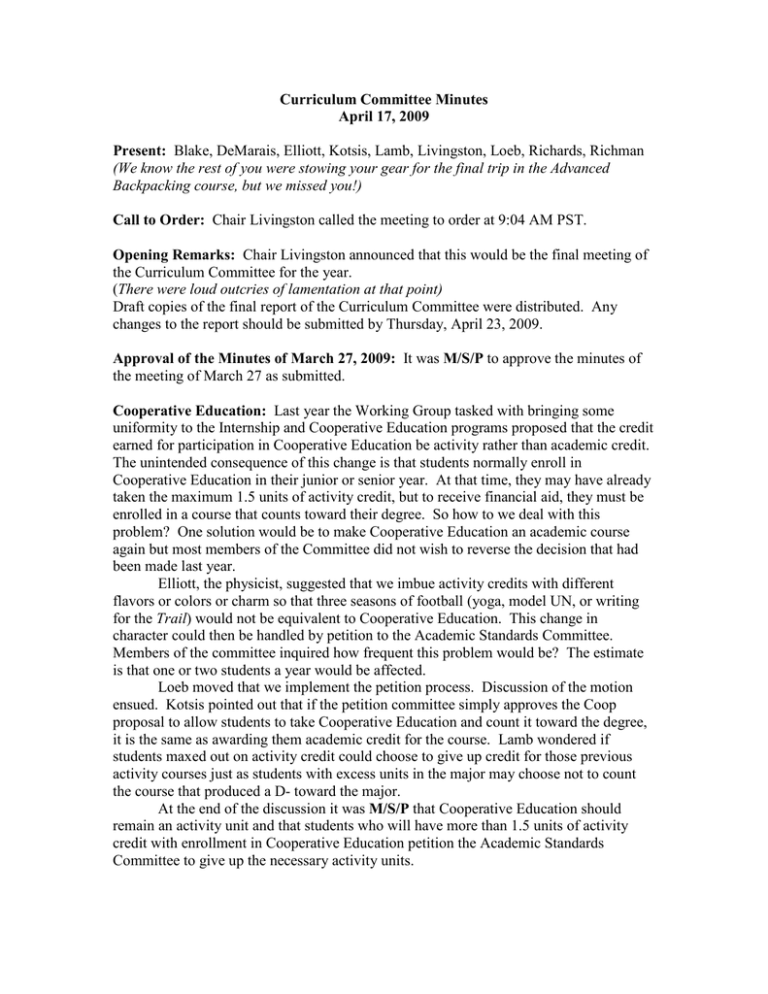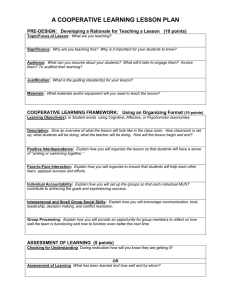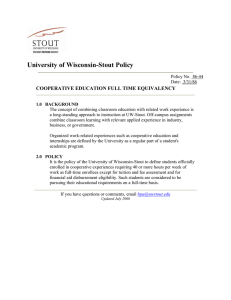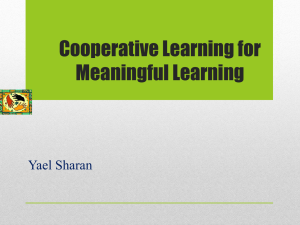Curriculum Committee Minutes April 17, 2009 Present:
advertisement

Curriculum Committee Minutes April 17, 2009 Present: Blake, DeMarais, Elliott, Kotsis, Lamb, Livingston, Loeb, Richards, Richman (We know the rest of you were stowing your gear for the final trip in the Advanced Backpacking course, but we missed you!) Call to Order: Chair Livingston called the meeting to order at 9:04 AM PST. Opening Remarks: Chair Livingston announced that this would be the final meeting of the Curriculum Committee for the year. (There were loud outcries of lamentation at that point) Draft copies of the final report of the Curriculum Committee were distributed. Any changes to the report should be submitted by Thursday, April 23, 2009. Approval of the Minutes of March 27, 2009: It was M/S/P to approve the minutes of the meeting of March 27 as submitted. Cooperative Education: Last year the Working Group tasked with bringing some uniformity to the Internship and Cooperative Education programs proposed that the credit earned for participation in Cooperative Education be activity rather than academic credit. The unintended consequence of this change is that students normally enroll in Cooperative Education in their junior or senior year. At that time, they may have already taken the maximum 1.5 units of activity credit, but to receive financial aid, they must be enrolled in a course that counts toward their degree. So how to we deal with this problem? One solution would be to make Cooperative Education an academic course again but most members of the Committee did not wish to reverse the decision that had been made last year. Elliott, the physicist, suggested that we imbue activity credits with different flavors or colors or charm so that three seasons of football (yoga, model UN, or writing for the Trail) would not be equivalent to Cooperative Education. This change in character could then be handled by petition to the Academic Standards Committee. Members of the committee inquired how frequent this problem would be? The estimate is that one or two students a year would be affected. Loeb moved that we implement the petition process. Discussion of the motion ensued. Kotsis pointed out that if the petition committee simply approves the Coop proposal to allow students to take Cooperative Education and count it toward the degree, it is the same as awarding them academic credit for the course. Lamb wondered if students maxed out on activity credit could choose to give up credit for those previous activity courses just as students with excess units in the major may choose not to count the course that produced a D- toward the major. At the end of the discussion it was M/S/P that Cooperative Education should remain an activity unit and that students who will have more than 1.5 units of activity credit with enrollment in Cooperative Education petition the Academic Standards Committee to give up the necessary activity units. Activity Credit Course Scheduling: We then turned to a related topic: the existence of activity credits, the demands in some classes, and the fact that 1.5 units are accepted toward the degree. Because some students have been unable to fulfill obligations in their academic classes because of conflicting requirements for activity courses, a faculty member asked the Curriculum Committee to eliminate activity courses. The other issue is the problem of accepting 1.5 units toward the degree. Many departments on campus do not have 0.5 unit courses so a student in those majors has to take an additional 1.0 unit course and graduate with 32.5 units. Unfortunately, “lots of students” do not realize that they will have no way to pick up 0.5 academic units and arrive at their last semester 0.5 units short of the 32 units. The Registrar’s Office suggests that we change the number of activity units accepted for the degree to a whole number: either 1.0 or 2.0. The sense of the committee as a whole was that increasing the number of activity units that could be counted toward the degree was not acceptable. But without time to consider this further, the Committee would like to charge those hardy souls on the Committee next year with a thorough consideration of these issues. Reports from Working Groups: Working Group 1: M/S/P the approval of Religion 250: Medicine and Christianity in the Early Centuries by Catherine Burris as a Humanistic Approaches core. M/S/P to accept the five year review of Theatre Arts including approval of Theatre 323: Projects in Dramaturgy as a major requirement in Theatre Arts and Theatre 375: Engaging World Theatre: Tradition and Innovation as an elective in the major. Both courses by Geoff Proehl. Working Group 2: M/S/P to decline approval of a minor in Bioethics but suggested that the proposer develop Bioethics as an interdisciplinary emphasis. Working Group 3: M/S/P approval of two courses for the Connections core: African American Studies 346: African Americans and American Law by Jim Jasinski Connections 304: The Idea of Britishness by Priti Joshi and David Smith. Working Group 4: Were surprised to discover that this was the final meeting of the semester. They have collected data on the “3 upper division courses” requirement for graduation and have discussed the issues but had not yet produced a final report. In general, they note that the requirement seems to be working. They will produce a report and send it to members of the committee for perusal. Working Group 5: Noted that the Asian Studies Curriculum Review is deferred until 2009-10. Adjournment: Richman M/S/P for adjournment at 9:45 AM. Respectfully submitted, Mary Rose Lamb





